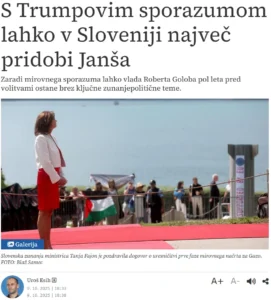From the outset of Israeli operations in Gaza, it was clear that the current coalition would strongly rely on anti-Semitic international politics, putting significant pressure on Israel (primarily in the context of domestic political posturing), and then turn a blind eye to Hamas’ crimes. Some strategists on the left already saw this as a winning combination for the elections, as it could attract both the anti-Semitic far left and the anti-Semitic far right – an important part of the electorate. Then Trump thwarted their plans with the peace agreement. Now, one of the Slovenian regime’s official mouthpieces has directly admitted that Gaza is the left’s trump card, which it is losing with President Trump’s peace deal.
Uroš Esih, who is considered a left-wing political propagandist in Slovenia, published a scandalous article in the newspaper Delo last week, entitled: “In Slovenia, Janša stands to gain the most from Trump’s agreement,” in which he bluntly stated that the Gaza issue was nothing more than political posturing and that Foreign Minister Fajon and other government representatives were never interested in peace in Gaza or the welfare of the Palestinians, but rather used the bodies of Palestinian children to launch their next try to get to the positions of power. Esih’s writings are usually extremely left-wing, offensive to the right wing and the citizens who agree with right-wing points, but at the same time, he represents part of the monolith of the political left, which is also represented in parliament. In the past, he called farmers who wanted to occupy the capital with their tractors psychopaths, quoting the lyrics of a Croatian song in the process. Of course, he is always on the side of left-wing coalitions and strongly opposed to the right, which is why many perceive him as a left-wing mouthpiece.
It is, of course, fundamentally inhumane to talk about who in a country 3,000 kilometres away will “gain” from Hamas no longer hiding behind women and children. Esih, however, turns this entire thesis into a peculiar acknowledgement by the left that Gaza is, in fact, a political cannon fodder for them.

Esih is not interested in peace itself – he is interested in how Slovenian actors perceive peace. Namely, in his article, he argues that there are “significant political and ideological differences between the response of the pro-Palestinian government and the opposition,” which is allied with Netanyahu, as the government is striving for the ultimate goal of two states, while the opposition is not.
Slovenian government defeated because it supports the two-state solution
If we read between the lines, we can see that Esih regrets the fact that “the peace agreement guarantees Israel’s security and interests” and emphasises that the Slovenian Foreign Minister wants the agreement to lead to the realisation of the two states solution, while the leader of the opposition, Janez Janša, supports the demilitarisation of Gaza (Esih therefore sees the disarmament of terrorists as a bad thing).
He quotes an assistant professor at the Faculty of Social Sciences, Faris Kočan, who argues that Palestinian statehood in the agreement is conditional on so many factors, including Israel’s final approval, that it is becoming very clear that the agreement in practice prevents any potential for Palestinian statehood and does not give the Palestinians any guarantees that they will ever be able to achieve independent administration, which, in his opinion, makes countries such as Slovenia the losers. In this context, all those countries “that are sincerely committed to the idea of a two-state solution,” including Slovenia, have in a way lost or agreed to a one-state solution.
This makes it abundantly clear that the Slovenian far-left government will be a political loser if it does not continue its propaganda campaign around Gaza, as this is its lifeline at a time when the country is in a state of advanced disintegration in terms of security, finance, economy, and society.
The Slovenian government’s solution for continuing the Palestinian hysteria
Esih, however, does not stop at relativising the end of the war because the terrorist regime will never get its own state, but also offers the government a rhetorical branch to lean on in the future when it can no longer rely on the corpses of children who died because of Hamas. He quoted Kočan as saying: “According to the Slovenian political leadership, Israel is committing genocide in Gaza. The agreement may put an end to the genocide, but the assessment of the genocide itself is far from complete. If the government is serious about adhering to the principles of international law, international justice, solidarity, and the sovereign equality of states, it will certainly have to continue to support all processes and probably also join South Africa’s lawsuit against Israel before the International Court of Justice.”
Strong responses to the article
The article, which can also be seen as a kind of guide for foreign policy in the coming months, drew a sharp response from opposition leader Janez Janša, who said: “For leftists in Slovenia and around the world, the Palestinian flag is a cover behind which they hide their corruption and moral degeneration.”
MP Žan Mahnič of the Slovenian Democratic Party (Slovenska demokratska stranka – SDS) added: “Finally, Uroš Esih has publicly written what we have been saying all along! Our government and the leftists are obsessed with Gaza and the Palestinians. They need this issue and are exploiting it exclusively for domestic political purposes. Because they have no program, no ideas, and no vision for the future.”
“Am I reading correctly that some people are sad because peace is being established? That’s crazy…” wrote Uroš Urbanija, editor of the Planet TV media outlet.
Kajzer: This is not an article based on verifiable facts
We also asked former diplomat Tone Kajzer for his opinion on Esih’s article and its significance. He described it as an internal political pamphlet, saying: “It is more than obvious that this is not a journalistic article based on verifiable facts and knowledge of international relations and the current situation or balance of power in the Middle East. It is an internal political pamphlet, to put it mildly.”

He added that he is pleased with the developments in the Middle East, that the balance of power in the region has shifted, and that the extremists represented by the regime in Tehran are losing influence despite substantial support from the so-called Dragon-Bear alliance of Russia and China. In his opinion, the overall situation in the region is developing in line with expectations.
“And, of course, this is positive from the perspective of Europe’s security and actual interests, as it takes the wind out of the sails of extremists (especially on the left) who have exploited Palestine for internal strife and grossly manipulated the issue to score domestic political points. Of course, things in the Middle East, which is one of the nerve centres of the geopolitical storm, are still extremely unpredictable,” he concluded.
M.I.


